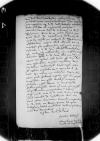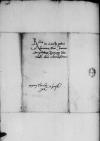List #2357
Stanisław HOZJUSZ (HOSIUS) do Ioannes DANTISCUSVilnius, 1540-11-17
| odebrano Heilsberg (Lidzbark Warmiński), 1540-11-27 Rękopiśmienne podstawy źródłowe:
Publikacje:
| ||||||
Tekst + aparat krytyczny + komentarz Zwykły tekst Tekst + komentarz Tekst + aparat krytyczny
Reverendissimo in Cristo Patri et Domino, domino
Reverendissime Domine, domine colendissime.
Officiosissimam servitutis meae commendationem.
Iam erat de arca negotium ex Reverendissimae Dominationis Vestrae sententia confectum. Data fuit ... illegible⌈...... illegible⌉ illi ms. inspiciundi reg. inspiciendi⌈inspiciundims. inspiciundi reg. inspiciendi⌉ potestas, adiunctis tamen reverendissimo
Contendebam ego contra, ut mitterentur, cum nihilo minus liberum foret superinscribed in place of crossed-out esset⌈essetforetforet superinscribed in place of crossed-out esset⌉ Reverendissimae Dominationi Vestrae illis non uti, si ex re non essent. Sed visum est
Cetera scripsi paulo ante Reverendissimae Dominationi Vestrae. Nova, si quae sunt, narrabit
Commendo me gratiae Reverendissimae Dominationis Vestrae ac Deum precor, ut quam diutissime vivat incolumis.
Eiusdem Reverendissimae Dominationis Vestrae servitor deditissimus


 BCz, 1618, p. 386
BCz, 1618, p. 386